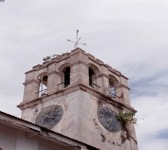
The Clock Tower which is not so much noticed or popular among children and tourists nowadays was erected in 1892 by the company called J. Bavreras 73 years before The Gambia’s Independence in 1965 and was refurbished in 1897 by the Bathurst Women to mark the 60th Anniversary of the Queen’s ascension to the throne.
It is the first Clock Tower in Destination Gambia situated in the middle of the former Secretariat right on top of the roof of the building housing the Ministry of Finance in Quadrangle. It was officially inaugurated by Governor Llewellyn. The Jubilee Clock Tower in the olden days when it was perfectly working served great purposes, particularly during the working hours when it chimed every key hour of the day. According to narration, it was believed that in the olden days, the sound from the Clock Tower when it chimes could be heard in Lamin village especially when the wind is strong and blowing across Lasso Wharf, the present day Bond Road in Banjul.
Hassoum Ceesay, a historian and director general of the National Centre for Arts and Culture (NCAC), affirmed that “it is one of the little known heritage sites erected in 1892 to commemorate the 60th anniversary of the coming to power of Queen Victoria who was until that time the longest serving British Monarch. But, of course, now she has been overtaken by Queen Elizabeth who has clocked 70 years on the throne.”
Narrating how it came into being, there were competitions among the British colonies of the Commonwealth – Gold Coast, Nigeria, Sierra Leone, and The Gambia on which would do something that will be most memorable to commemorate the Queen’s ascension. After many debates, the community agreed to contribute money to establish a clock tower.
“The Gambian women who can be ranked as women of substance at that time were eager to copy the British and wanted to have Jubilee Clock Tower they can call the Big Ben Bathurst. The clock was imported from the UK, erected, and programmed to chime every hour. But there were certain hours that it will chime many times and in those days there were very few people that got clock at home or wrist watches,” DG Ceesay explained.
Meanwhile, many people in Bathurst at that time depended on this clock to know the time to be in the office, as work started those days by 7:30 am; the time for the break was 12:30 to 2 pm and it is compulsory to have a break then if you were a government employee while closing time was at 5:30 pm. “At those hours the clock will chime and if you grew up in Bathurst those days then your head will work with the time as many programmed their memories as per the chime of the Tower Clock and it was a reliable source of time,” he explained further.
The Jubilee Clock Tower however remains in its position though no longer working but it is one of the heritage sites in the capital city of Banjul.
With the importance of the clock to many people, it can be repaired or replaced with a new one to continue serving its purpose especially since it is one of the country’s heritages meant for generations and visitors to the Gambia particularly residents and workers in Bathurst. If it is repaired, it would bring nostalgia for people who might be in their 80s or 90s who can remember those days that the clock functioned.





